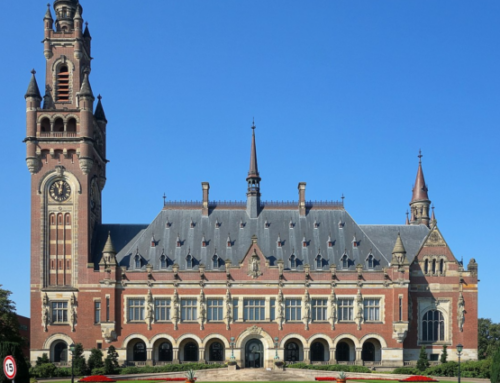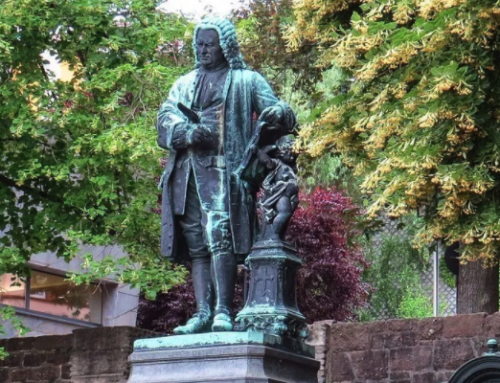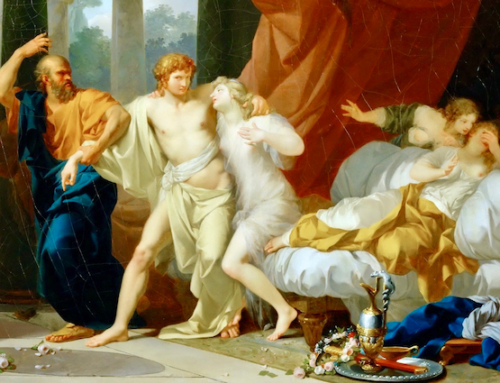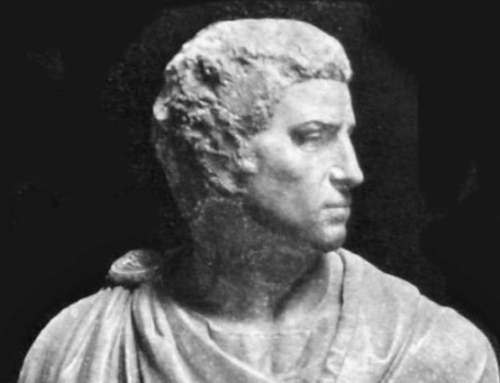I want to begin by saying how my theme is related to justice. Plato and Aristotle often connect justice with wholeness. And it is wholeness—the whole of virtue and the whole of a political community—that is very much at issue, and at risk, in Plato’s Statesman. Perhaps at risk as well is the wholeness of logos or discourse.
Plato’s mysterious stranger from Elea delights in division. In the Sophist, he uses the method of dividing genera or kinds to pin down the elusive professor of wisdom. In the Statesman, he uses this same method, with some modifications, to show the genuine statesman and king “naked and alone by himself” (304a). But the stranger isn’t all about logic. Like Socrates, he enjoys images of all sorts and regularly avails himself of their curious power to illuminate. In the Statesman, soon after the great myth about reversed becoming, the stranger announces the need for paradigms in inquiry. He tells young Socrates that they would do well in their search if they came up with a paradigm that would, in its small and humble way, help to reveal the magisterial form, the eidos, of the true king.(277d)
This paradigm, as we soon hear, is weaving (279b). Politics is the master-art that weaves together all the other arts in the city and bends them to its high purpose. But it is not until late in the dialogue, almost at the end, that the precise meaning of the paradigm is explained. The true statesman, we discover, knows how to interweave courageous and moderate types of souls. To use the language of the paradigm, he combines the warp or hard woollen threads, which resemble courageous natures, with the woof or soft threads, which resemble moderate natures. Properly combined, these human threads produce “the web of statesmanly action” (311B). This web is the wisely constituted polis—the beautiful end of politics conceived as a productive art.
But the path to this beautiful end requires an account that the stranger calls “somewhat astonishing”—astonishing because it proceeds from the view that virtue is not a happy unity in which different portions of virtue are “friendly” to one another, as the many say and as Socrates suggests in other dialogues. On the contrary, virtue has within it, and seems even to be defined by, a war between courage and moderation. The stranger is unsparing in his formulation. The two virtues, he says, “have a deep-seated enmity toward one another and maintain an oppositional faction in many of the things that are” (306b). The stranger, we must note, does not ask Socrates’ question: What is virtue? Instead, he posits an opposition between two forms of virtue. This opposition, more than anything else in the dialogue, defines the political art.
To illustrate his point, the stranger urges young Socrates to consider the two forms (eidē) that come to light when we praise things for their beauty—various doings and makings, whether of bodies or of souls (306c). We praise things that manifest “keenness and swiftness.” These can be the things themselves or their images—the swift movement of a runner, for example, or a vase painting depicting such a runner. The name for what underlies such praise is andreia, “courage” or “manliness.” This is the form we are admiring when we praise the keen and the swift.
But we also praise what the stranger calls “the gentle form of generation.” We praise as beautiful those actions and thoughts that are quiet, modulated, slow, and careful. The name for this form is orderliness or composure, kosmiotēs (307b). It refers to moderation as the virtue of keeping things measured and undisturbed. We think of things like a smooth transition in a piece of music or a soothing tone of voice. To sum up, we are thoroughly contradictory in our praise of beauty. We praise as beautiful those things that have a manly look and we also praise the look that is opposed to manliness. Furthermore, we blame as ugly both what is opposed to manliness and what is opposed to the opposite of manliness, that is, what is opposed to moderation. We do all this, we should note, not because we are inept but because beauty itself is self-opposed.
Shifting now from things that display opposed virtues to the very natures of courage and moderation, the stranger refers to these as “looks [ideas] destined… to be split apart in hostile faction.” He then turns to the people who have these natures in their souls, not by choice or upbringing but by nature (307b-c). Faction is here described as a feud between warring families. Members of each family judge the beautiful and the good solely in terms of their family virtue, and hate members of the other family simply because they are in the other family. This love of Same and hate of Other blinds each family to the common, if problematic, eidos of virtue that both families share. Each family, by virtue of its virtue, is blind to the virtue and beauty of the other. As a consequence, members of neither family really know their own virtue, since they do not know why and in what manner their characteristic virtue is beautiful and good. Because of this blindness and the mutual hate it engenders, the two families, though they live in cities, may be said to occupy, in Hobbes’s phrase, a pre-political “state of nature” with respect to virtue.
As if this situation weren’t bad enough, the stranger goes on to say that the family feud between noble types is child’s play compared with the disease that is “the most hateful of all for cities” (307d) .It is here that the stranger shows why the two forms of virtue, and the two opposed types of soul, constitute the central problem of politics. Indeed, he demonstrates the urgent need of the political art in the Reign of Zeus, the era in which the world has been abandoned by its divine shepherd and guide.
The stranger gives a devastating portrait of what happens to cities that fall prey to the ethos of peace at any cost. He refers, paradoxically, to the eros for composure (307e)—the only appearance of this word in the dialogue—as if to say: “Look at these people, young Socrates. To themselves they seem all calm and reserved, but in fact they have a disordered desire for order. Why, they are as crazy as a man in love!” Perhaps there is also the suggestion that eros, for the stranger, is to be associated with what is soft or tender rather than with the sort of tough love that Diotima describes in the Symposium (203c-e). In any case, because of their unmeasured love of order, these people slip unwittingly into an unwarlike condition and raise their children to be similarly unwarlike. The condition spreads through the city like an infection and becomes more virulent with each generation. Since unmixed moderation cannot accommodate itself to the aggression of an enemy, cannot rouse citizens to display a decisive and manly spirit when this is needed, the city eventually loses its freedom and becomes enslaved.
The very same result awaits the macho city that wants war at any cost and is driven by thumos, spiritedness, rather than eros. The rage for courage leads citizens and rulers to be constantly tensing up their cities for opportunities to display what they wrongly take to be the whole of virtue. Before too long, the city that idolizes courage eventually picks a fight with the wrong adversary, an enemy it can’t vanquish, and so is vanquished in turn. Like the peace-loving city, the war-driven city ends in destruction and slavery (308a).
Now we normally think of faction, stasis, as the strife between two parties within a single city, but the stranger’s view in the present context is very different. The political problem par excellence is, for him, not violent heterogeneity (for example, champions of oligarchy vs. champions of democracy) but virtuous homogeneity, the idolatry of one of two opposed virtues, either courage or moderation. To be sure, there is faction in its usual sense within the form of virtue. This is the eidetic situation, known only to the philosophic statesman, but the real-life political problem occurs when the two naturally opposed virtues are not simultaneously present. Hence, as the stranger sees it, the devastating political outcome of the principle “likes attract and opposites repel” is enacted on the stage of inter-polis relations, when a city suffers destruction at the hands of another city rather than from internal discord. The stranger is surely not unaware of the evils of faction in this latter sense—the horrors, for example, that Thucydides describes in the case of Corcyra (Thucydides, History of the Peloponnesian War, 3.82). But, for the stranger, this is not the central political problem which has its source in the eidetic opposition between the beautifully tough and the beautifully gentle that pervades “many of the things that are.” The problem is not vice, or human nature simply, or intense disagreement over which regime is best, but virtue, which is by nature turned against itself.
We might try to make sense of the stranger’s unsettling account by citing Aristotle’s distinction between natural and ethical virtue, the latter being guided by the intellectual virtue of phronēsis or practical wisdom, which allows the virtuous individual to avoid excess and deficiency by perceiving the mean (Nichomachean Ethics, 6.13). This is helpful to an extent, but it takes the sting out of the stranger’s insight into why virtue is a problem. The stranger would no doubt agree with Aristotle’s opinion that virtuous dispositions, when left to themselves, are dangerous and that they need practical wisdom in order to be reliable virtues. But far more important to the stranger is the primordial dyad of courage and moderation—the dyad that defines the task of the political art. That task is not how to interweave a multiplicity of virtues in order to make them one, but how to unite two naturally opposed virtues so that they may complement rather than repel one another and contribute their distinctive powers to the political web. These are toughness and flexibility, quickness and caution, forcefulness and grace.
It is tempting to say that the problem of politics, for the stranger, is that of knowing how to interweave the male and the female forms of ethical beauty. It is true that each virtue, by the stranger’s account, must apply to both men and women. How else could one trait come to dominate a city’s population through marriage and procreation? Nevertheless, the manliness of courage strongly suggests as its correlate the femininity of moderation. If we admit this sexual distinction in the case of the two virtues, it becomes interesting, to say the least, that the paradigm for political wisdom in the dialogue is the feminine art of weaving. This may be Plato’s way of showing that, of the two opposed virtues, moderation, as the love of order and peace, is closer than courage to justice and wisdom. It may also show Plato’s philosophic preference for music over gymnastic, since weaving engages in deft material harmonization. In good statesmanship, as in philosophy, grace trumps force to become the greatest force of all. This is true even for our tough-minded, methodically rigorous stranger, who tells young Socrates that the statesman and good lawgiver knows how to instil right opinions in others “by the muse of kingship” (309d).
The stranger proceeds to outline the education and nurture that will generate the needful thing—the artful synthesis of virtuous opposites in a coherent political whole. This whole, this web, in order to be beautiful, requires beautiful threads that have been previously prepared by means of a subsidiary art. Statesmanship, like all compositional art, is elitist: only the best materials will do. And so, there must be an artful way to determine who is fit for an ethical-political education, and who is not. This consists in observing children at play in order to see which ones show signs of a virtuous disposition, whether of courage or moderation. The stranger lays special emphasis on those who prove to be uneducable. He describes them as “violently driven off course by a bad nature into godlessness and arrogance and injustice ” (308E-309A). The political art, here seen in its harsh and decisive aspect, casts them out “by punishing them with death penalties and exiles and the greatest dishonors.” And those who “wallow in ignorance and much baseness” are put into the class of slaves.
The stranger, at this point, explicitly connects the union of manly and moderate natures with the intertwining of warp and woof (309b), in effect closing the paradigm-web he began to weave earlier in the dialogue. The city, in order to be a durable garment suited to the protection of all those it embraces, needs both kinds of human threads: the hard and the soft. This unity of opposites requires a two-tiered system of civic education that produces two sorts of “bonds”—one higher, one lower. The higher bond is said to be divine, since it applies to the part of the soul that is “eternal-born,” the part that thinks and holds opinions. The lower human bond is marriage, which applies to what the stranger calls “the animal-born part,” that is, the part of the soul that has to do with bodily desire. The bonds are produced successively: first the higher, then the lower. Once the higher bond of right opinion is in place, the stranger asserts, the lower one isn’t difficult to bring about (310a). This optimism presupposes that the divine bond is strong enough to overcome the greatest of all human drives—the erotic attraction that human beings have for one another and that connects them, as we hear in the Symposium, with the striving for immortality.(207a)
The higher tier of the educational process aims at inculcating “genuinely true and also steadfast opinions about beautiful and just and good things” (309c). These opinions are implanted in both types of noble individuals. In other words, the inculcation of “one opinion about what’s beautiful and just and good” supersedes the idolatry of a single virtue and overcomes the natural impulse to welcome one’s like and shun one’s unlike. Moderate and courageous individuals will share the opinion that it is good for the city that they mingle and bad if they don’t. In other words, they will learn to respect, if not love, a virtue higher than either courage or moderation—the virtue of justice. They will believe that they and their respective virtues are threads that must be woven together to form the political web.
 I note in passing that the education the stranger describes is based entirely on the cultivation of habits and right opinion. There is no philosophic education for guardians, no turning of the soul from becoming to being, as there is in the Republic. The stranger’s version of a city in speech may be the work of a philosophic statesman, but it does not appear that this statesman, though possessing kingly science, is, in fact, a king in this city.
I note in passing that the education the stranger describes is based entirely on the cultivation of habits and right opinion. There is no philosophic education for guardians, no turning of the soul from becoming to being, as there is in the Republic. The stranger’s version of a city in speech may be the work of a philosophic statesman, but it does not appear that this statesman, though possessing kingly science, is, in fact, a king in this city.
The stranger dwells on how the higher sort of education, which aims at the divine bond, tempers the excess in the two opposed virtues. If a manly individual takes hold of true opinions about what is good and beautiful and just, he will “grow tame and in this way be most willing to commune with just things.” Without these opinions, he will degenerate into a beast (309e). Similarly, the order-loving individual who holds these same true opinions will become “genuinely moderate and intelligent,” and the one who doesn’t will rightly be called simpleminded or foolish. The establishment of these true opinions takes place through laws and customs that apply only to those naturally suited for an ethical education. This education, the stranger asserts, is the “drug” prescribed by the ever-vigilant art of politics. It is the antidote for one-sided virtue.
At last we reach the stranger’s account of marriage, the “human bond” implanted by the political art. This bond, though lower than the other, is crucial, since the city’s continuance and well-being depend on procreation through sexual union. We should recall that it is not courage and moderation per se that bring about political downfall but rather the gradual build-up and concentration of a single virtue through sexual generation over the course of time. As the stranger approaches his culminating definition, he gets down to the nitty-gritty of why people marry. He dismisses those who marry for wealth or power and focuses on those whose care is family and children. These are the people who marry, or who arrange the marriages of their sons and daughters, for the serious (if wrong) reason that they always choose partners who are of their own family when it comes to virtue and eschew members of the opposite family.
The political art counteracts this error, goes against nature, by compelling members of each “family” to overcome their natural repugnance for the other and to marry against type. This will prevent the spread of a single trait by producing hybrids that combine both virtuous types. The stranger does not say what home life will be like for married opposites, nor does he care. The only thing that matters, from a political standpoint, is that the virtues are mixed rather than kept separate. Of course, genesis in the Reign of Zeus is unpredictable: There will always be children whose nature reduplicates that of, say, a courageous mother rather than a moderate father. And so, the political art must exercise perpetual vigilance and continually oversee marriage and sexual union. The war on nature must go on.
The needful union of opposed virtues must be enforced at the highest level of the city—that of the rulers. The stranger acknowledges that it is possible for one individual to have both virtues.(311a) The monarchic city must choose this sort of individual as its supervisor. If more than one ruler is required—if the city is aristocratic—then the ruling class must have both kinds of virtuous individuals. The reason is that moderate rulers are cautious, just, and conservative, but they lack, the stranger says, the needful acuity and vigor, which would be supplied by the courageous among the ruling class. The stranger ends his “astonishing account” of virtue on a negative note: “And it’s impossible for all things having to do with cities to turn out beautifully in private and in public when these characters [courage and moderation] aren’t present as a pair” (311b).
Only one thing remains: The final definition of the web that is produced by the true statesman’s knowledge. Will this web, as the stranger glowingly describes it, ever be woven in deed as it is in speech? From the stranger’s perspective, it does not matter. The goal was to define statesmanship solely in terms of the statesman’s knowledge or science, apart from whether he actually rules, founds, reforms, or advises (259b).
What, then, does the statesman know? Not, it seems, how to lead individuals to virtue, but how to temper the virtue they already have by nature. The statesman’s wisdom is the wisdom of defence. That is why the stranger tends to dwell more on bad things to be avoided and feared than on good things to be sought and aspired to. Politics is a defensive art. It is embodied in the web that ends the dialogue. Strange to say, when we finally find the statesman “naked and alone,” he turns out to be a maker of garments, which earlier in the dialogue were placed in the class of defences (279c-280a). He is the maker of the web that is both the body politic and the political cloak that defends the otherwise naked city from its enemies, the virtuous from their monomania and wrong marriages, and all its inhabitants from exposure and need. Perhaps most of all, the political web protects the city from the ravages and uncertainties of time. A good garment is one that wears well. It must protect us from seasonal extremes. The same is true of the political garment, which must defend the city not only during the winter of war and its discontents but also during the summer of peace, prosperity, and inattention.
In Plato’s Statesman, politics appears in its true light only when it is seen in the context of the stranger’s cosmic myth about the Reign of Kronos and the Reign of Zeus. The myth compels us to judge the tension-riddled, endangered life we have now by contrasting it with an earlier peaceful life that ended in disappearance rather than old age and death, that had no sex or sexual desire, and that needed neither politics nor clothes. The myth discloses what is most needful for beleaguered humanity in this our Reign of Zeus—the era that depends on the god-like statesman and shepherd because it can no longer depend on a kindly nature and a caretaking god.
I suspect that the world for the stranger is, like virtue, fundamentally incoherent. Strictly speaking, there is no kosmos, no permanent world-order that grounds the inherent goodness of the virtues. Instead there are two opposed cosmic eras, two opposed directions of becoming, and two opposed forms of human life and human nature. In the Reign of Zeus—that is, in the realm of politics—the “condition of ancient disharmony,” the tendency toward degenerateness that is woven into the very constitution of the world on account of its bodily being, asserts itself (273c). That is why we need the Promethean powers of method and art—to make order where there is no order. In the Statesman—one of Plato’s fascinating experiments in post-Socratic philosophy—Plato tempts us to consider the grounds and implications of this modern-sounding world-view.
Republished with gracious permission from the St. John’s Review, Volume 55.1 (Fall 2013).







Leave A Comment